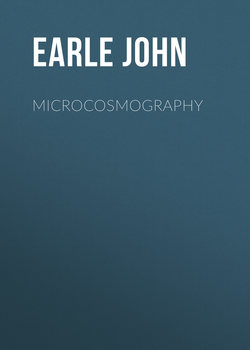Читать книгу Microcosmography - Earle John - Страница 12
MICROCOSMOGRAPHY;
or,
A piece of the World characterized
IV.
A MEER DULL PHYSICIAN
ОглавлениеHis practice is some business at bedsides, and his speculation an urinal: he is distinguished from an empiric, by a round velvet cap and doctor's gown, yet no man takes degrees more superfluously, for he is doctor howsoever. He is sworn to Galen and Hippocrates, as university men to their statutes, though they never saw them; and his discourse is all aphorisms, though his reading be only Alexis of Piedmont,9 or the Regiment of Health.10 The best cure he has done, is upon his own purse, which from a lean sickliness he hath made lusty, and in flesh. His learning consists much in reckoning up the hard names of diseases, and the superscriptions of gally-pots in his apothecary's shop, which are ranked in his shelves, and the doctor's memory. He is, indeed, only languaged in diseases, and speaks Greek many times when he knows not. If he have been but a by-stander at some desperate recovery, he is slandered with it though he be guiltless; and this breeds his reputation, and that his practice, for his skill is merely opinion. Of all odours he likes best the smell of urine, and holds Vespasian's11 rule, that no gain is unsavory. If you send this once to him you must resolve to be sick howsoever, for he will never leave examining your water, till he has shaked it into a disease:12 then follows a writ to his drugger in a strange tongue, which he understands, though he cannot conster. If he see you himself, his presence is the worst visitation: for if he cannot heal your sickness, he will be sure to help it. He translates his apothecary's shop into your chamber, and the very windows and benches must take physic. He tells you your malady in Greek, though it be but a cold, or headach; which by good endeavour and diligence he may bring to some moment indeed. His most unfaithful act is, that he leaves a man gasping, and his pretence is, death and he have a quarrel and must not meet; but his fear is, lest the carkass should bleed.13 Anatomies, and other spectacles of mortality, have hardened him, and he is no more struck with a funeral than a grave-maker. Noble-men use him for a director of their stomach, and ladies for wantonness,14 especially if he be a proper man.15 If he be single, he is in league with his she-apothecary; and because it is the physician, the husband is patient. If he have leisure to be idle (that is to study,) he has a smatch at alcumy, and is sick of the philosopher's stone; a disease uncurable, but by an abundant phlebotomy of the purse. His two main opposites are a mountebank and a good woman, and he never shews his learning so much as in an invective against them and their boxes. In conclusion, he is a sucking consumption, and a very brother to the worms, for they are both engendered out of man's corruption.
9
The secretes of the reverende maister Alexis of Piemount, containyng excellente remedies against diuers diseases, &c. appear to have been a very favourite study either with the physicians, or their patients, about this period.
They were originally written in Italian, and were translated into English by William Warde, of which editions were printed at London, in 1558, 1562, 1595, and 1615. In 1603, a fourth edition of a Latin version appeared at Basil; and from Ward's dedication to "the lorde Russell, erle of Bedford," it seems that the French and Dutch were not without so great a treasure in their own languages. A specimen of the importance of this publication may be given in the title of the first secret. "The maner and secrete to conserue a man's youth, and to holde back olde age, to maintaine a man always in helth and strength, as in the fayrest floure of his yeres."
10
The Regiment of Helthe, by Thomas Paynell, is another volume of the same description, and was printed by Thomas Berthelette, in 1541. 4to.
11
Vespatian, tenth emperor of Rome, imposed a tax upon urine, and when his son Titus remonstrated with him on the meanness of the act, "Pecuniam," says Suetonius, "ex prima pensione admovit ad nares, suscitans num odore offenderetur? et illo negante, atqui, inquit, e lotio est."
12
"Vpon the market-day he is much haunted with vrinals, where, if he finde any thing, (though he knowe nothing,) yet hee will say some-what, which if it hit to some purpose, with a fewe fustian words, hee will seeme a piece of strange stuffe." Character of an unworthy physician. "The Good and the Badde," by Nicholas Breton. 4to. 1618.
13
That the murdered body bleeds at the approach of the murderer, was, in our author's time, a commonly received opinion. Holinshed affirms that the corps of Henry the Sixth bled as it was carrying for interment; and Sir Kenelm Digby so firmly believed in the truth of the report, that he has endeavoured to explain the reason. It is remarked by Mr. Steevens, in a note to Shakspeare, that the opinion seems to be derived from the ancient Swedes, or Northern nations, from whom we descend; as they practised this method of trial in all dubious cases.
14
"Faith, doctor, it is well, thy study is to please
The female sex, and how their corp'rall griefes to ease."
Goddard's "Mastif Whelp." Satires. 4to. Without date. Sat. 17.
15
Proper for handsome.
